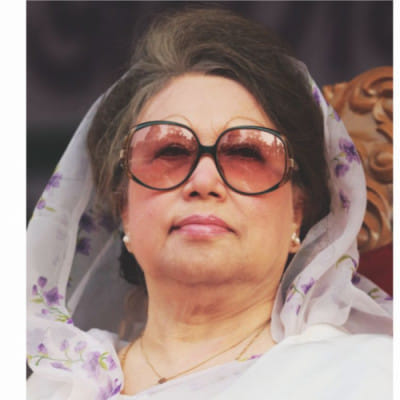Khaleda confessed abuse of power, says court

BNP Chairperson Khaleda Zia in her defence statement confessed that she had abused her power, said the court in the verdict of Zia Orphanage Trust graft case.
“So, there is no bar to punishing her under section 409 of Penal Code and 5(2) of Corruption Prevention Act-1947,” the verdict says on page 624.
The way the six accused in collusion with each other misappropriated the money has a presumptive value, the court said, adding this is very much relevant to disposal of the case.
But Masud Ahmed Talukder, one of Khaleda's lawyers said the BNP chief in her statement categorically denied misappropriating money and abusing power.
"It was either an unwanted mistake or the court deliberately added untrue statements to the verdict," he told The Daily Star when contacted last night.
Khaleda, also a former prime minister, always termed the case “politically motivated” and accused the government of trying to use court for keeping her away from politics and elections.
She made the same allegation while giving a statement before the court under section 342 of the Code of Criminal Procedure (CrPC) during the trial.
The Special Judge's Court-5 of Dhaka, which found Khaleda guilty in the graft case 11 days ago, released the full verdict yesterday.
Khaleda's lawyers said they collected a copy of the verdict and may file an appeal against the verdict with the High Court today.
On February 8, Judge Md Akhtaruzzaman of the special court sentenced the BNP chief to five years' rigorous imprisonment in the graft case.
The court also sentenced Khaleda's eldest son and BNP Senior Vice Chairman Tarique Rahman and four others to 10 years' rigorous imprisonment, and fined Tk 2.10 crore each.
The other convicts are Kazi Salimul Haque, ex-BNP lawmaker from Magura; Sharfuddin Ahmed, a businessman; Mominur Rahman, a cousin of Tarique; and Kamal Uddin Siddique, former principal secretary to the PM.
The Anti-Corruption Commission filed the case with Ramna Police Station in July 2008, accusing Khaleda and five others of misappropriating over Tk 2.1 crore that had come from a foreign bank as grants for orphans.
HOW THE MONEY WAS MISAPPROPRIATED
When Khaleda was prime minister in 1991-1996, she received $12,55,000 from the United Saudi Commercial Bank, the court said.
Through her secretary Kamal Uddin, she opened an account named “Prime Minister's Orphanage Fund” on June 2, 1991 with the Ramna branch of Sonali Bank.
The amount $12,55,000 was deposited to the bank account. It is equivalent to Tk 4,44,81,216.
Khaleda kept the money as fixed deposit and it eventually increased to Tk 4,66,76,298.
The amount was divided into two -- Tk 2,33,33,550 each. One part was transferred to Zia Memorial Orphanage Trust and the other to Zia Orphanage Trust on November 13, 1993 as signed by Kamal Uddin Siddique.
The money sent to Zia Orphanage Trust's account (STD-7) was deposited to Sonali Bank's Gulshan New North Circle on November 15, 1993, the court said.
There was no transaction in the Zia Orphanage Trust's account before November 15, 1993, it said.
Tarique and Mominul withdrew the money illegally from Sonali Bank's Gulshan New North Circle and transferred it to Prime Bank's Gulshan branch.
Later, Salimul Haque, being chairman of Prime Bank, abused his authority and transferred the money to Prime Bank's Eskaton Branch.
Using various tactics, he transferred Tk 2,10,71,643 to personal account of Sharfuddin, who later withdrew the money, the court said.
"This is how the money from the government's orphanage fund or the government money was misappropriated," the court said.
It was proved from the documents that Khaleda and other accused abusing power transferred or helped transfer the money of the government's orphanage fund to a name-only Zia Orphanage Trust to get benefit or give benefit to others.
"This is how Tk 2,10,71,643 of Prime Minister's Fund was misappropriated," the verdict said.
The court said the money came in 1991 but it was not spent until November 1993 when the Zia Orphanage Trust was not even established.
“The series of facts proved that the money was provided to Zia Orphanage Trust for misappropriating,” the court said.
Not spending money till 1993 after receiving it in 1991 falls under the purview of an offence, it said.
Moreover, till 2018, the money was not spent for orphans; only 2.79-acre land was bought but no orphanage was established there, it added.
THEY WERE GOVT EMPLOYEES
In its full verdict, the court said a person has to be a government employee, a banker, a merchant or an agent to be accused under section 409 of the Penal Code.
Both Khaleda and Salimul were members of parliament, and as per the existing law, lawmakers are considered government employees, the court said.
Though Tarique and Mominur were trustees of the private trust, they will be considered government employees in line with the decision of the Supreme Court, it said.
Only Sharfuddin Ahmed is to be regarded as a merchant or an agent. "Therefore, the court thinks section 409 of the Penal Code is applicable to all of them," the verdict said.
FINANCE CRIMINALS
It has been proved through evidence that the accused, in collusion with each other, misappropriated Tk 2.10 crore from the government's orphanage fund, the court noted.
Though the amount may not be big at present but it was a big sum when the corruption took place, it said.
Khaleda was the then prime minister while Salimul was a lawmaker.
Being a top government official, Kamal Uddin helped Khaleda to open a back account for government's orphanage fund.
Later, he transformed money from the fund to two private trusts (Zia Memorial Orphanage Trust and Zia Orphanage Trust) illegally which is tantamount to helping the two accused commit crimes, the court said.
Employing different tactics, three accused -- Tarique, Mominur and Sharfuddin -- helped directly to misappropriate the money from government's orphanage trust in collusion each other, it said.
“By this way, the court thinks, all the six accused have been benefited in one way or the other. They will be regarded as finance criminals of the state.”
Financial corruption hampers the country's economic progress and its bad effect spreads to all tiers of the society, it said.
THEY DESERVED LIFE SENTENCE
The court said all the accused deserve punishment under section 409/109 of the Penal Code for misappropriating Tk 2.20 crore from government's orphanage trust in collusion with each other.
Section 409 says, “Whoever, being in any manner entrusted with property, or with any dominion over property in his capacity of a public servant or in the way of his business as a banker, merchant, factor, broker, attorney or agent, commits criminal breach of trust in respect of that property, shall be punished with [imprisonment] for life, or with imprisonment of either description for a term which may extend to ten years, and shall also be liable to fine.”
Section 109 talks about crimes and punishment for abetting any offence under the Penal Code.
As all the accused except Sharfuddin are considered as government employees and section 5(2) of the Corruption Prevention Act 1947 is also applicable to them, the verdict said.
Section 5(2) says, “Any public servant who commits or attempts to commit criminal misconduct shall be punishable with imprisonment for a term which may extend to seven years, or with fine, or 4[ with both, and the pecuniary resources or property to which the criminal misconduct relates may also be confiscated to the State].”
But they were sentenced only under section-409/109 of the Penal Code as the said offences were committed simultaneously, the court said.
“The accused committed financial crimes in collusion with each other, and for this reason, example needs to be set by awarding them the highest punishment [life sentence],” the court said.
“However, the court thinks that awarding life sentence would not be appropriate considering their age, social status and amount of the misappropriated money,” it said.
The court awarded Khaleda five years' rigorous imprisonment, considering her “physical condition, age and social status.”
It sentenced the other five accused to 10 years' rigorous imprisonment each and slapped a fine of Tk 2.10 crore each, taking into consideration their “age and social status”.
They were asked to pay the fine within 60 days.
Section 409 did not mention “rigorous” or “simple imprisonment”, rather it just cited “imprisonment”. But the convicts were awarded “rigorous imprisonment”, keeping legal aspects in mind, it noted.
The court also gave directives for seizing the Zia Orphanage Trust's money kept at Sonali Bank's Gulshan New North Circle Branch in favor of the state.
KHALEDA MAY FILE APPEAL TODAY
Khaleda may file an appeal with the High Court today, challenging the trial court verdict, one of her lawyers said.
“We will also seek her bail along with the appeal,” Khaleda's lawyer Sanaullah Miah told this newspaper after receiving the certified copy of the judgment yesterday.
A convict needs the certified copy of the verdict to appeal against the judgment or file a bail petition with the HC.
Mokarram Hossain, an official of Special Judge's Court-5 in Dhaka, handed over the 1,100-page verdict to Sanaullah, 11 days after the judgment was delivered.
Following the verdict on February 8, the court cancelled Khaleda's bail and sent her to prison. Law enforcers then took her to the old central jail on Nazimuddin Road in the capital.

 For all latest news, follow The Daily Star's Google News channel.
For all latest news, follow The Daily Star's Google News channel. 








Comments